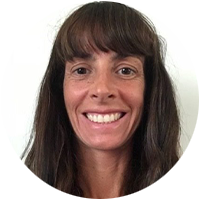Verónica Donato Garello, PhD | Global Clinical Scholars Research Training, Master of Medical Sciences in Clinical Investigation

When Veronica Donato was 15 years old, she and her family traveled more than 5,500 miles from their homeland of Argentina to visit Boston. She still remembers standing on the corner of Longwood Avenue, looking up at the gleaming façade of Harvard Medical School and feeling awe struck.
“I said to my father, ‘I want to go to Harvard one day,’” she recalls. “That was my dream.”
More than a decade after that first trip, she did return to the United States—and ultimately made it to Harvard Medical School’s Global Clinical Scholars Research Training (GCSRT) Program. But, she had a few detours along the way.
Mapping a New Route to Translational Research

First, she earned a PhD in basic biological science in Argentina and then decided to pursue her dream of Harvard.
“I looked at the GCSRT curriculum and I knew right away this program was perfect for me,” Donato says. She recognized that the course material would help to broaden her skills so that she could move from basic research to a focus on translational and clinical research. This would provide her with the ability to interact in some way with patients and see the impact of her work first-hand. This prompted her to apply and to be accepted, into the program. Since the program is mainly online, she was able to attend while living in Argentina.
Building New Research Skills and a Stronger Network
“The GCSRT program was so amazing, not only because it’s Harvard but also because of the networking opportunities that it provided,” Donato says. In fact, participating in classes and workshops with people of different backgrounds located all around the world was particularly enriching for her.
“This was not something I had experienced in Argentina. I never had the opportunity to interact with multiple cultures before. But through GCSRT, I learned so much from people with all different cultures, experiences, and skills. It was truly a turning point in my career,” she stresses. For instance, she says she learned how to take different approaches to find common ground with people from all over the world, and she learned to find a way to work with colleagues toward a common vision.
While enrolled in Global Clinical Scholars Research Training, she also had an opportunity to come to the United States as a post-doctorate researcher at the University of Alabama at Birmingham. In this role at the university, she explored the relationship between bacteria and their host with the goal to gather data that could help to treat or cure some diseases and mitigate the aging process. Yet she quickly came to realize she was not satisfied with spending so much time being isolated in the laboratory without reaching patients.
Taking Advantage of Other Opportunities at Harvard
Upon completing GCSRT in 2019, Donato knew she wanted to continue to grow her knowledge base and also to find a place that felt like a better fit for her. Therefore, even though she already had a PhD, she decided to move to Boston and enroll in Harvard Medical School’s Master of Medical Science in Clinical Investigation program in 2020. She selected the program’s Translational Research Track, since this closely aligns with her career goals.
“With my PhD, I had a very good background in my field; but now, with a master’s degree, I will have new tools and skills to put this background to work in an even more meaningful way,” she stresses.
“I was so excited to finally make it to Harvard in person,” she says. However, she faced one big challenge: she needed to secure a job while attending school in order to be able to stay in the U.S. Therefore, she quickly began applying for research fellowships in Boston and ultimately was fortunate to secure an opportunity at the Dana-Farber Cancer Institute that met her criteria and enabled her to work while learning.
“I joined Dana-Farber’s Medical Oncology Department as a part-time research fellow, where I continue to be employed while I attend the master’s program. At Dana-Farber, I conduct translational research looking at the post-transplant immune reconstitution and chronic graft-versus-host disease in pediatric patients,” Donato explains. The job also has provided an opportunity to put the many skills she learned at GCSRT to work on the job.
Donato is also excited to help train other future researchers.
“While earning my master’s, I am also actively involved in teaching and mentoring students,” she says. She currently serves as a lecturer at Northeastern University and also at the Harvard Extension School.
Positioning for a Successful Future as a Translational Researcher
All of her training and experiences are positioning her to continue developing her career in exciting directions.
“My plan for the future is to continue to focus on hematopoietic stem cell transplantation in children. Young patients suffering malignant and non-malignant diseases are very vulnerable; I want to help them to recover, or at least mitigate their diseases, to help improve their quality of life,” Donato says. With a Harvard education to draw on, she adds that she is excited to see where her career takes her in the coming years.
Learn more about Global Clinical Scholars Research Training and Master of Medical Sciences in Clinical Investigation.
Written by Lisa D. Ellis